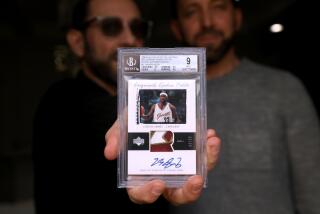High Life : A WEEKLY FORUM FOR HIGH SCHOOL STUDENTS : Card-Carrying Entrepreneur : Collections: Tustin High junior is off and running in the business world as a very successful trader in sports cards.
More than 700 of the most famous dealers in sports cards and memorabilia will be on hand today when the 12th National Sports Collectors Convention gets under way at the Anaheim Convention Center.
Among those dealers will be a 16-year-old from Tustin who is proving that sports cards can still be a kid’s game.
Jeff Thompson, who will be a junior at Tustin High School in the fall, has been collecting baseball cards since his first Little League game. It’s his progression in the hobby that has caught the eye of even the most experienced dealers.
A collector until the age of 12, Thompson then began his career in the business. He started by working at Keeping Score, a hobby card shop in Santa Ana. Thompson said he regularly worked local card shows for the shop’s owner, learning the ins and outs of the business, which at the time was beginning to boom.
Two years later, Thompson decided to take what he called “a really big step up.” He acquired a resale license and permit and entered into self-employment.
“It’s hard at first because you have to know what to buy and sell and know all about the cards themselves and be into the market,” he said.
Thompson said the next step was gaining acceptance from his dealer peers and obtaining order forms from the card companies.
“I was lucky to get in when I did,” he said. “For example, Upper Deck was just getting started and I was able to get an order form from them. Now it’s impossible to get one.”
Thompson works out of his family’s house, buying in bulk from companies and other dealers, utilizing both mail orders and a computer service.
“My parents were sports fans, and I’ve been around baseball since I was 2, so I know just about everything there is to know about the sport,” said Thompson, who played on Tustin’s junior varsity baseball team last season.
“I’ve collected baseball cards since I was 6, so it was relatively easy to learn what I needed to.”
The national convention, which runs through Sunday, will showcase some of the greatest names of the hobby. Thompson said he feels fortunate to be among its dealers, but cautioned that not everyone can make the type of progression he has.
“The opportunity doesn’t seem to be there anymore,” he said. “Now everybody’s trying to get into the business. Cards these days don’t have as much opportunity to go up in value that they’ve had in the past. It’s become really tough to make money because there’s so much product out there and so much competition.
“I’ve made good money in the business (he expects to make upwards of $15,000 at the national convention) because I’ve been lucky. Most everything I’ve invested in turned for a tidy profit.
“Take the Topps Stadium Club series. I thought they would get hot, so I bought a bunch at $325 a case. Now they’re going for $1,200 per case.”
Thompson said many outside the profession and even some dealers are beginning to look at the sports card collecting business with a skeptical eye, charging that the materialistic outlook of many of today’s participants is harmful for the future of the business, and predicting an ensuing downside. Thompson says no way.
“Actually, I think collecting is better as a business because it’s unregulated,” he said. “Anyone who thinks they can make a lot of money at it can go out and try.
“I have about a million cards in my possession, but I don’t keep them forever. If they’re a good investment, I’ll keep them for about five years. I do have personal collections of my favorites, but I (get more joy out of) making money at dealing.”
Thompson is pretty sure that, despite the competition, sports card collecting will be his occupation of choice for the immediate future.
“I can see myself doing this for at least five or 10 more years, or at least until it becomes unprofitable,” he said.
“I enjoy the business because it’s so (engrained) in society. I mean, you could collect stamps, but there’s nothing to base the value on. Baseball cards are a rarity that are based on sports, the backbone of America.”
More to Read
Go beyond the scoreboard
Get the latest on L.A.'s teams in the daily Sports Report newsletter.
You may occasionally receive promotional content from the Los Angeles Times.










